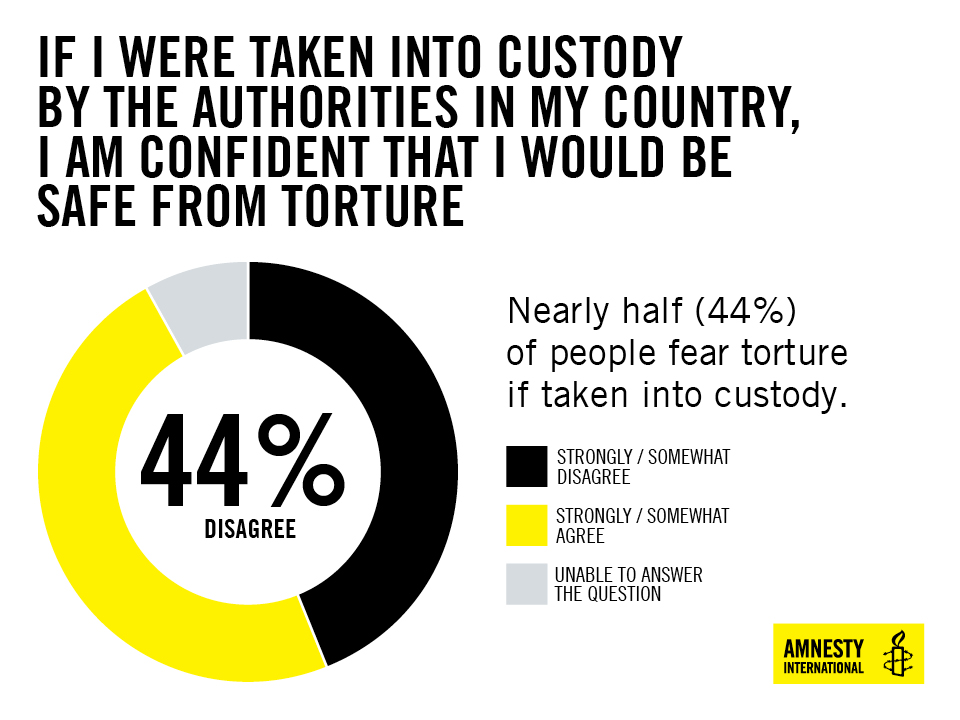Darrell Cannon was tortured by three Chicago Police Department detectives at a remote site on Chicago’s South Side. Over course of a day, they pressed a cattle prod to his testicles and put it into his mouth. The officers attempted to lift him off the ground by handcuffs secured behind his back, contorting his upper body. They repeatedly made him believe that they had loaded a shotgun and rammed in into his mouth, breaking his tooth.
“These are all things they enjoyed doing,” Darrell Cannon told Amnesty International, his voice cracking.
He spent 24 years in prison on the basis of a coerced confession that was tortured out of him – ten of those years suffering further degradation in solitary confinement at Tamms Supermax prison.
Combating torture has long been part of Amnesty International's legacy - and until more than half of the people in the world no longer live in fear of torture, it will continue to be our future.
But listening to Darrell’s story is also critically important, because it is not unique. He is one of more than 100 men and women tortured under the direction of Chicago Police Commander Jon Burge between 1972 and 1991.
Sixteen torture survivors have since been exonerated and released, others served out decades in prison on the basis of coerced confessions. Today, at least 19 men are still behind bars, all of whom maintain that they gave coerced confessions after being tortured, including being suffocated, electrocuted, beaten, burned, subject to mock execution or otherwise brutalized by Burge and his detectives. None of the men have ever received the reparations necessary to become physically, emotionally or mentally whole.
On December 10, 1984, the U.N. Convention Against Torture and Other Cruel, Inhuman and Degrading Treatment or Punishment was adopted by the United Nations General Assembly. The Convention was ratified by the United States ten years later.
Meanwhile, just as torture continued unchecked in the shadows of the Windy City, the unimaginable horrors of the torture chamber remained a reality for countless men, women and children around the world. In the past decade, Amnesty International has documented torture and other ill treatment not only in U.S. jails and prisons, but also against “war on terror” detainees at Guantanamo and other detention sites.
We have let unimaginable cruelty become mundane.
This is echoed across the globe, in every world region. In the past five years alone, Amnesty International has reported on torture or other ill-treatment in at least three quarters of the world’s countries. In many of them, torture is systemic and routine. A new global poll reveals that almost half of the world’s population still do not feel safe from torture.
It is time to say “no more.”

That’s why Amnesty International has launched a global campaign to stop torture. In the United States, the “Stop Torture Campaign” will begin in our backyards, as we demand justice for the survivors of Chicago Police Torture and call for accountability for those tortured in the name of “national security.”
But it’s bigger than that. Because our human rights are inexorably bound with the rights of others, wherever they are in the world, we’re also campaigning for justice for torture survivors and systemic changes to prevent torture in Mexico, Morocco, Nigeria, the Philippines and Uzbekistan.
When the U.N. Convention Against Torture entered into force, it promised a future in which a global ban on torture would become a reality. Today, it represents three decades of a broken promise. Add your voice to the Stop Torture Campaign, and help fulfill the promise of the U.N. Convention.
Get started by taking action on behalf of the Chicago torture survivors, and learn more about ways to get involved on social media and about other opportunities for action at amnestyusa.org/chicagotorture.
Combating torture has long been part of Amnesty International’s legacy – and until more than half of the people in the world no longer live in fear of torture, it will continue to be our future.

Its about time that the countries guilty of torture, finding innocent people guilty and sentencing tjem to cruel and unusual punishment, were hels accountable. The US for a supposedly civilised country has the largest population of prisoners in the world. Prison is big business, generating a lot of money for the US government, who ate the real criminals. Something must be done to stop this absolutely inhumane behaviour.
Justice should be done, not 'seen' to be done.
There are thousands of cases of wrongful convictions and executions. Shame on you America. FREE ALBERT WOODFOX!
As a lifetime Chicago native and a human rights activist, I want to say thank you. Thank you for making torture both a national and an international issue in regards to the United States. It is time for all individuals who have been victims of torture, regardless of where they are from, to receive the justice, peace, and closure they deserve. This campaign may not solve every problem surrounding torture (in fact, I don't think any single campaign could ever do that) but Amnesty is taking the incredibly brave and prominent first step. Amnesty is starting a global movement. True to its history and its willingness to discuss human rights issues that have long been considered taboo, Amnesty international is leading the way to a better world, a world in which torture is always viewed as reprehensible and unacceptable, regardless of perceived threats, popular ideologies and/or cultural beliefs, or circumstances surrounding criminal cases.
Torture happens in the free world. Blockade of basic human rights prevent basic living. In humane Lorna Wallace
thats horribile
Nice way to get the best deals. Thanks for the information
Nice blog, the article you have shared is good.This article is very useful. My friend suggest me to use this blog. thank so much!